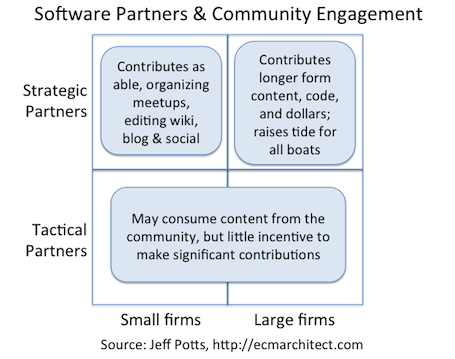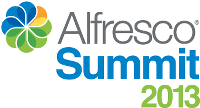There are people all over the world doing amazing things in the Alfresco community and that includes partners, but I often feel that partners are under-represented in our community. A small example is going to a city that has multiple partners headquartered there only to have one or two of them participate in a meetup. This is frustrating to me but should it be? Maybe my expectations are skewed by my open source/collaborative world view? Why should a partner, who earns revenue by selling time, spend time participating in the community for free?
First, some background on software vendor partnerships
Every software vendor or project has a community regardless of their business model or their license or whether or not they choose to invest in that community. And most software vendors have partners. These are firms who install, configure, customize, and extend the vendor’s software. The partnership formalizes the business relationship between the partner and the vendor.
To understand whether or not it is realistic to expect partners to participate in a community, it helps to understand the makeup of the partner ecosystem. I’d be shunning my consulting heritage if I didn’t use a two-by-two matrix to illustrate this:

The first axis in the matrix is the size of the partner. You might measure size by revenue, the number of billable consultants, or the number of vendors the firm partners with. It doesn’t really matter for this discussion. The second axis describes the nature of the partnership–is the partnership strategic or tactical for that partner?
A strategic partnership is just that–it is strategic to the partner’s business. A strategic partner actively works to improve their relationship with the vendor. They jointly close deals. They get their consultants trained up or certified on the technology. They might spend marketing dollars on events or campaigns that help promote their work with the software. If the software vendor goes away, or the partnership deteriorates, it adversely impacts a significant chunk of the partner’s revenue.
A tactical partnership is not strategic at all, it’s transactional, often opportunistic. A common way for these partnerships to happen is when a firm sees a potential project on Technology XYZ. Maybe they’ve done something with XYZ and maybe they haven’t, but they need to tick a box, so they do the bare minimum necessary to say they are a partner and then try to win the project. A partnership that starts out as tactical could grow into a strategic relationship over time. Or the firm may move on after one project, never getting any real traction with that vendor.
Every partner ecosystem has partners in these four quadrants. (Notice I do not make any mention of partner tiers. Software vendors often use tiers (Diamond, Platinum, Double-Dutch Chocolate) to help differentiate partners. It’s one way of helping customers figure out where a partner might be on the matrix. But I think the matrix does a better job for this discussion.)
What should a vendor’s community expect from each partner type?
I think it is safe to expect nothing from the partners in the tactical categories, regardless of their size. For this group, the community serves a purpose, but it is almost entirely one-way. These partners will read blog posts, tutorials, sample code, and wiki pages. They might even ask a few questions in the forums as they get up to speed on the platform, but it is unrealistic to expect much more.
Where I think the opportunity lies is in the strategic partners, but what the community offers the partner and what the partner is willing to invest is much different between small and large strategic partners.
Small, Strategic Partners
Let’s look at small, strategic partners first. The number one concern of a small partner is utilization and cash flow. A small, strategic partner needs lots of “at bats” and a reputation for getting on base and scoring runs. Small partners need visibility and credibility. Spending time in the community can help with that. The challenge for a small partner is that resources are super constrained. Often, the same individual is doing billable work and closing the next deal. It leaves little time to give to the community.
For partners in this group I think it is fair to expect contributions to the community that can be done it smaller chunks of off-peak time. Blogging, wiki cleanup, hosting or organizing meetups, and participating in the forums in a fairly ad hoc manner are some things that will help the community tremendously and in turn helps the partner with name recognition and credibility.
Large, Strategic Partners
Of course large partners still care about utilization and cash flow. But there are a few things about large firms that allow them to invest more in their vendor communities: they have a deeper bench (more consultants), they have access to more capital, and often, they have more negotiating power with their clients.
Let’s look at this bench advantage. When a firm has many consultants they can smooth out the inevitable ups-and-downs of utlization (assuming they also have lots of projects). It also means that compared to smaller firms, they have more bench time to invest in the community. Let’s say there are 2000 potentially billable hours in a year. If you’ve got 30 consultants, there are 60,000 hours you could bill. Assuming a generous utilization rate of 90%, that leaves 6,000 hours of down time, spread across all of the consultants, throughout the year.
It’s not fair to expect all of those hours to go to the community. Consultants need bench time to train, work on internal projects, and help sell new business. But I do think a significant chunk of that time can be invested in the community. Imagine what a huge difference it would make if just 20% of the down time mentioned above was invested in the community. Now multiply that times the number of large, strategic partners in a vendor’s ecosystem and it is huge.
What is the incentive for a large, strategic partner to invest that time in the community? They will benefit from name recognition and credibility benefits that a smaller partner seeks, but larger firms have marketing dollars so that may be less important to them.
I mentioned that larger partners often have more negotiating power with their clients. This can allow them to turn some of their client work into open source projects (like add-ons or extensions) or even into full business solutions. These will have their own communities. Investing in the vendor’s community can help bootstrap these solutions and the communities around those.
There is a bigger picture reason large, strategic partners should invest in the community. It is the “rising tide raises all boats” argument. When the software vendor succeeds, the strategic partners succeed. So anything the partner can do to make the vendor successful will return dividends. I saw this at Optaros, Alfresco’s first platinum partner. Optaros gave me time to blog and to write tutorials and even a book. These helped thousands of people get ramped up on the platform, including customers and competing partners. We were helping the tide rise. Optaros didn’t stay in the Alfresco business long enough to see the full return on those investments, but I know from the success of similarly-sized partners around at that time that they were there to be had.
Free Riders
Clearly, there are partners, small and large, who believe it is important to participate in the community. There are those, however, who will reap the benefits of a healthy community without participating at all. They lock up their best practices, tips & tricks, code snippets, and know-how behind walled gardens, or, worse, they simply don’t share them at all. There is not much a community can do about this other than to try to educate these firms on the benefits of participating and encourage customers to buy services from those who are willing to demonstrate and share their expertise in public, for the benefit of the entire community.
Summary
A strategic partnership is just that–it is strategic to both the partner and the vendor. The community is a huge part of the success of the software vendor (open source or proprietary), so strategic partners ought to invest and participate in the community. Their ability to do that and the types of investments they make differ, primarily due to resource constraints. It is unreasonable to expect more than what the partner can give, but for a strategic partnership to be truly successful, they must be a visible and frequent presence in the community.




